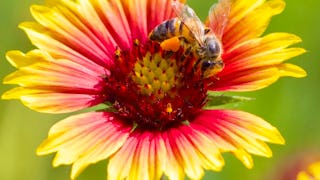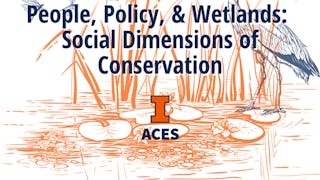This course is an introduction to ecology and ecosystem dynamics using a systems thinking lens. Through a case study on Mozambique's Gorongosa National Park, learners will explore how scientists study ecosystems, and investigate the complex array of factors that inform management efforts. At the end of the course, learners will be able to grapple with real-world conservation questions, such as whether an ecosystem can recover from anthropogenic disruption and what role humans can, and should, play in that recovery.



Ecology: Ecosystem Dynamics and Conservation

Instructor: Ana Luz Porzecanski
72,843 already enrolled
Included with 
(3,339 reviews)
Skills you'll gain
Details to know

Add to your LinkedIn profile
5 assignments
See how employees at top companies are mastering in-demand skills

There are 5 modules in this course
We begin in Gorongosa National Park, Mozambique, and pose the question: Can this ecosystem recover after a 15-year civil war? To answer this question, learners must first consider what they need to know—what are the parts that make up this ecosystem, and how do they interact and work together? How do ecosystems react to disruption? How do we know? We will begin to explore the ecosystem as a dynamic whole rather than as a collection of parts, considering how changes might affect the system in a variety of ways. This application of a systems thinking lens to understanding ecosystems will be a common theme throughout the course.
What's included
3 videos7 readings1 assignment
This week, we narrow the focus to populations within ecosystems. Who or what populates an ecosystem, and what are their roles? How do these roles change over time? What happens when a species is removed from a system? How do scientists study the populations within an ecosystem, from its largest to its smallest inhabitants? You will explore the important roles different species can play—such as ecosystem engineers, keystone species, and indicator species—and how they shape their ecosystems.
What's included
3 videos2 readings1 assignment
This week we focus on community ecology and further explore the interactions between species in an ecosystem. For instance, how does the decline in a population from an ecosystem (as was the case in Gorongosa) affect the other players? How does adding a population -- such as an invasive species or translocated herds -- affect an ecosystem?
What's included
4 videos2 readings1 assignment
This week, we will further their understanding about what makes an ecosystem a system by examining the flow of energy and matter through different parts of the environment. This includes understanding the interactions of biotic and abiotic factors within an ecosystem and the services each component provides. We will introduce the complicated effects of both abiotic (climate change) and biotic (herbivory) interactions within a coastal salt marsh system, touching on ecological concepts of thresholds in a system and ecosystem resistance and resilience.
What's included
3 videos2 readings1 assignment
This week we conclude by focusing on the role of humans in ecosystems: how humans interact with and are shaped by their environments. We explore the meaning of the “anthropocene” (the title given to the current geological age in recognition of significant impact of human activities) and investigate management approaches that balance human needs and biodiversity. We also return to Gorongosa National Park to wrap up the course, shifting the conversation from "Can an ecosystem recover?" to "Should it recover?" and "What does a successful recovery look like?" We explore how conservation might have to adjust to future challenges such as climate change, extinctions, and human population growth. We also introduce the idea that a spectrum of conservation approaches is necessary, from the preservation of land and species, to the integration of biodiversity into market economies, to the creation and management of “novel” ecosystems.
What's included
4 videos3 readings1 assignment
Earn a career certificate
Add this credential to your LinkedIn profile, resume, or CV. Share it on social media and in your performance review.
Instructor

Explore more from Basic Science


Yale University
 Status: Free Trial
Status: Free Trial
Rice University
 Status: Free Trial
Status: Free Trial
University of Illinois Urbana-Champaign


Yale University
Why people choose Coursera for their career




Learner reviews
3,339 reviews
- 5 stars
86.34%
- 4 stars
12.18%
- 3 stars
1.04%
- 2 stars
0.14%
- 1 star
0.26%
Showing 3 of 3339
Reviewed on May 17, 2021
Makes your perspective go on a larger scale due to the intertwined effects of humans to our natural habitat and what we can do to actually live with all organisms on Earth harmoniously.
Reviewed on Jan 3, 2021
One of the best course, I have ever taken. The materials is not hard to follow and the in-depth explanation gives you a proper new perspective which is still open to debate due to conservation topic
Reviewed on Jun 21, 2020
This is an excellent course for beginners in the field of Ecology. I, myself, had never studied ecology before this. But the amount if understanding I got from this course is immense.
New to Basic Science? Start here.

Open new doors with Coursera Plus
Unlimited access to 10,000+ world-class courses, hands-on projects, and job-ready certificate programs - all included in your subscription
Advance your career with an online degree
Earn a degree from world-class universities - 100% online
Join over 3,400 global companies that choose Coursera for Business
Upskill your employees to excel in the digital economy
Frequently asked questions
Access to lectures and assignments depends on your type of enrollment. If you take a course in audit mode, you will be able to see most course materials for free. To access graded assignments and to earn a Certificate, you will need to purchase the Certificate experience, during or after your audit. If you don't see the audit option:
The course may not offer an audit option. You can try a Free Trial instead, or apply for Financial Aid.
The course may offer 'Full Course, No Certificate' instead. This option lets you see all course materials, submit required assessments, and get a final grade. This also means that you will not be able to purchase a Certificate experience.
When you purchase a Certificate you get access to all course materials, including graded assignments. Upon completing the course, your electronic Certificate will be added to your Accomplishments page - from there, you can print your Certificate or add it to your LinkedIn profile. If you only want to read and view the course content, you can audit the course for free.
You will be eligible for a full refund until two weeks after your payment date, or (for courses that have just launched) until two weeks after the first session of the course begins, whichever is later. You cannot receive a refund once you’ve earned a Course Certificate, even if you complete the course within the two-week refund period. See our full refund policy.
More questions
Financial aid available,



